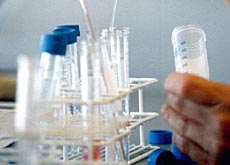
Sperm banks face donor shortage

Switzerland's sperm banks are facing challenging times - stocks are low and donors are few and far between.
Donor numbers dipped following a new law which ruled out donor anonymity.
The law was introduced on January 1, 2001, following an amendment to the Swiss constitution in 1992.
The new legislation brought Switzerland into line with the United Nations Convention on the Rights of the Child, which states that all children have the right to know the identity of their biological parents.
“The child, when he or she is 18, has the right to know the name of the donor of the sperm,” Ruth Reusser, head of the division of private law at the Swiss justice ministry told swissinfo.
“But the child can also get access to the name when there is an important reason before they’re 18.”
“If the child is sick, for example, and you don’t know what is wrong and you think it could be something in the family, the child or the legal representatives of the child could get access to the data about the donor,” she explained.
Rights of the father
However, Swiss law does not completely ignore the rights of the father.
Reusser says the father is protected under Swiss law if the donation is made in a recognised clinic.
“The child only ever knows the father’s name. It has no [legal right] to inheritance and the mother [cannot claim] alimony,” added Reusser.
Yet despite legal protection against the threat of paternity suits, Swiss men remain reluctant to donate their sperm.
Doctor Peter Fehr, a reproductive medicine specialist at the Schaffhausen sperm bank, believes it’s more of an emotional issue and that men are concerned about the future implications of any donations they make.
“They’re afraid because they don’t know what their situation will be in 20 or so years,” Fehr told swissinfo.
“Maybe they’ll have a family and if another child [sired through sperm donation] comes into this environment, it could be damaging to their family life.”
Attracting donors
However, attracting donors is only half of the problem. Of those who do come forward, only three per cent make it through the vetting process.
They have to be aged between 20 and 40, have a job, a high sperm count and no family history of genetic disease.
In addition, there’s a limit on how many children can be sired from one donor’s sperm – this is currently capped at eight.
The situation has got so bad in Italian-speaking Ticino that they’ve taken the step of importing sperm from the United States.
But in Schaffhausen in eastern Switzerland, Doctor Peter Fehr has resisted the temptation of importing “foreign” sperm, even though half of the 200 couples on his books are currently on a waiting list for sperm donations.
For the moment, Fehr has enough stocks to last six to nine months, but he is concerned about the future.
He says he needs a minimum of 25 donors to guarantee future fertility treatment.
But Fehr is determined to try to find new donors through the Internet, television adverts and magazine articles in the hope that Swiss men will come forward to help infertile couples achieve their dream of becoming parents.
swissinfo, Sally Mules
Donor numbers dropped after a new law which ruled against donor anonymity.
The new legislation brought Switzerland into line with the UN Convention on the Rights of the Child.
The child has no legal right to inheritance and the mother cannot claim alimony from the donor.

In compliance with the JTI standards
More: SWI swissinfo.ch certified by the Journalism Trust Initiative


























You can find an overview of ongoing debates with our journalists here . Please join us!
If you want to start a conversation about a topic raised in this article or want to report factual errors, email us at english@swissinfo.ch.